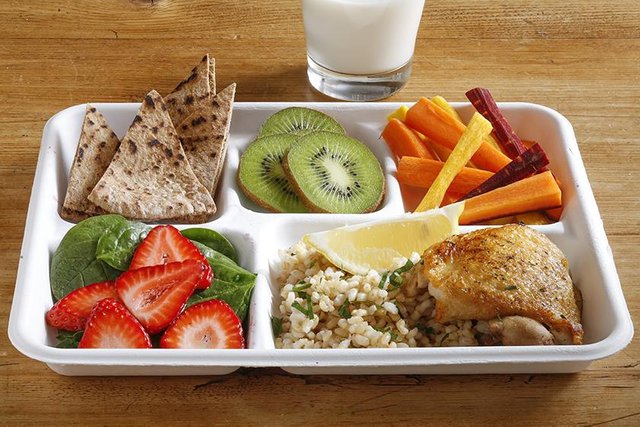A Parent's Guide to School Meals: Nurturing Healthy Eating Habits

(source - https://www.ecoliteracy.org/article/school-meals-all)
Introduction:
As a parent, ensuring that your child receives wholesome and nutritious meals is crucial for their growth and development. School meals play a significant role in providing children with the necessary nutrients they need throughout the day. This guide aims to assist parents in understanding the importance of school meals, making informed choices, and encouraging healthy eating habits for their children.
The Importance of School Meals:

(source - https://health.ucdavis.edu/blog/good-food/are-school-lunches-really-important-for-your-kids-health/2019/08)
School meals are designed to meet specific nutrition guidelines and cater to children's dietary requirements. They offer several benefits, including:
a. Balanced nutrition: School meals typically include a variety of food groups, providing a balanced mix of carbohydrates, proteins, fruits, vegetables, and dairy products.
b. Essential nutrients:

(source - https://www.netmeds.com/health-library/post/national-nutrition-week-must-have-essential-nutrients-in-your-regular-diet )
These meals offer key nutrients like vitamins, minerals, and fiber, supporting growth, cognitive function, and overall health.
c. Socialization and learning: Eating together in the school cafeteria encourages social interaction, good manners, and exposure to new foods.
Understanding School Meal Programs:
(source -https://www.nycfoodpolicy.org/food-policy-snapshot-california-universal-free-school-meals/)
Familiarize yourself with the school's meal program to make informed decisions. Consider the following:
a. Menu planning: Schools often rotate menus on a weekly or monthly basis, offering diverse options to accommodate various dietary needs.
b. Special dietary requirements:

(source - https://absolutely-mama.co.uk/special-dietary-requirements/)
If your child has specific dietary restrictions or allergies, communicate with the school's food service staff to ensure appropriate meal alternatives.
c. Nutrition information: Inquire about the nutritional content of the meals served, including calorie counts, ingredient lists, and allergen information.
Encouraging Healthy Choices:

(source - https://www.healthychildren.org/English/ages-stages/gradeschool/nutrition/Pages/Making-Healthy-Food-Choices.aspx)
Empower your child to make nutritious choices by:
a. Engaging in meal planning:

(source - https://www.parentcircle.com/how-meal-planning-helps-father-and-son-to-bond-better/article)
Involve your child in planning and preparing meals at home. Discuss the importance of a balanced diet and encourage them to choose healthier options.
b. Packed lunches: If your child prefers packed lunches, ensure they include a variety of fruits, vegetables, whole grains, and lean proteins. Limit sugary snacks and opt for water or milk instead of sugary beverages.
c. Leading by example: Be a positive role model by practicing healthy eating habits at home. Children are more likely to adopt healthy choices when they see their parents doing the same.
Communicating with School Authorities:
Maintain open communication with the school regarding your child's dietary needs:
a. Parent-teacher meetings: Discuss your child's nutritional requirements during parent-teacher meetings to ensure the school is aware of any specific concerns.
b. Feedback and suggestions: Provide feedback on the school meals and offer suggestions for improvement, fostering a collaborative relationship with the school.
Reinforcing Healthy Habits at Home:
Support your child's nutrition journey outside of school by:
a. Family meals: Encourage regular family meals, as they promote healthy eating habits and communication among family members.
b. Snack choices: Stock your pantry with nutritious snacks like fruits, vegetables, yogurt, and whole-grain crackers to encourage healthier choices.
c. Limiting processed foods: Minimize the consumption of processed and fast foods at home, opting for homemade meals whenever possible.
Conclusion:
By understanding the significance of school meals and actively participating in your child's nutrition, you can ensure they receive the necessary nutrients for their well-being and academic success. Encourage healthy choices, maintain communication with school authorities, and foster a supportive environment at home. Together, we can promote lifelong healthy eating habits for our children.

Important facts for a healthy future.Good job.
Hi! @minidu, The image in your post is not a copyright free image. Please use copyright free image. Source
If you want you can use copyright-free images in your post which is completely free. Hope you don't do this kind of work anymore. Some free image site link below:
https://pixabay.com/
https://www.pexels.com/
https://unsplash.com/
ok.I will use